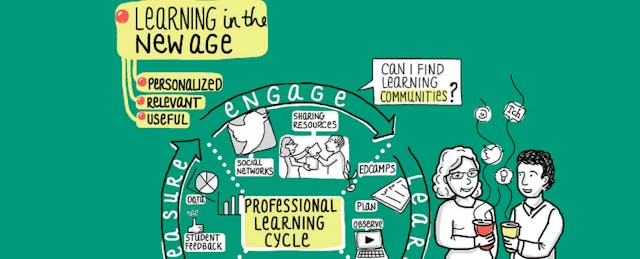Even as schools across the US rethink how they deliver learning experiences to their students, districts, too, are rethinking professional development for teachers. We look for all learners--teachers as well as students--to construct their own learning path, explore how to deepen their skills and support their colleagues. Districts play an important role in this process, by encouraging teachers to build specific, new skills and leveraging the skills teachers already have.
So this year, with support from the Bill & Melinda Gates Foundation, EdSurge embarked on a research program to explore the tools and products available to districts and how they systematically support teacher development, creating the 64-page report “How Districts Get Personal: Retooling Professional Development.” In the PD report--our second annual--we offer a framework to help districts identify how to get the most from the tools they are already using, and to find others to fill in the gaps.
Here are a few of the insights from our report:
- Differentiated PD experience helps. PD systems tool makers are developing features to differentiate each teacher’s PD experience to focus on the unique needs, talents and challenges of each teacher by tailoring recommendations, creating custom content pathways and playlists, and monitoring teacher usage patterns.
- Instructional support is hard to find. Defined as providing teachers with resources, such as lesson plans or assessments, instructional support tools may be scaffolded to teach teachers how to implement a specific standard, or may be accompanied with videos that break down an instructional technique featured in a lesson. Teachers frequently say they find instructional support most desirable, but few tools integrate it into their offerings.
- Put teachers in the driver’s seat. While many tools are configurable, few intentionally give teachers autonomy over their learning experience, instead subjecting them to the district’s general PD experience.
- Focus on proficiency based tools, rather than time based tools. The biggest shift for PD systems of the future will involve shifting their focus to recognizing when teachers gain proficiency or mastery, rather than how much time they spend in a workshop or whether they complete an online course.
Using the insights from our study, we designed this framework to help school and district administrators find the right systems when it comes to managing and delivering professional learning experiences. The work, including in depth reports on 15 different products, is available in “How Districts Get Personal: Retooling Professional Development.”
Through our research, we developed a nuanced understanding of what works, what doesn’t, and what tools can assist effective professional learning. We hope these offerings will help district and school leaders find where in the PD cycle their teachers need support, and see how different tools can play a role in the development process. Ultimately, the power of professional learning experiences is up to educators and those who support them; through this report, we hope to provide background to inform the process.


